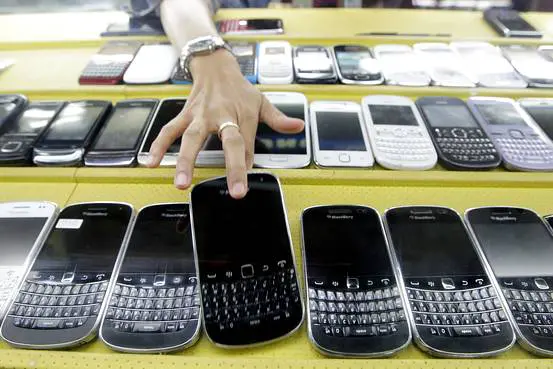(THE WALL STREET JOURNAL) BlackBerrymay be struggling to regain relevance in the global smartphone market,but its instant messaging is still a hit in Indonesia.
Many Indonesians remain loyal to their curated groups of friends and family onBlackBerry Messenger, known asBBM, even though some of them no longer use their BlackBerry devices.
Take Fredi Ferdianto, a 30-year-oldBBMuser from the main trading port city of Surabaya in East Java. He says he has fourBBMaccounts, mainly to manage his online business of selling imported goods from China. Among those four, three run on his BlackBerry devices and one– his personal account– runs on an Android device.
“I chooseBBMbecause almost everyone[that I know in Indonesia]usesBBMrather than WhatsApp or Line,” Mr. Ferdianto said.
While globally, Facebook Inc.’s WhatsApp dominates the messaging market with a billion monthly active users, in Indonesia, it’s a different story. BBMhas over 55 million monthly active users, BlackBerry said in January, making it the dominant messaging app in Indonesia. WhatsApp andFacebook Messenger trailed behindwith around 50 million active users for each app, according to estimates from U.K.-based social media consultancy We Are Social.Facebook, which owns both platforms, doesn’t break down number of users by country and only said that more than 800 million people worldwide now use Messenger. The social network had 82 million monthly active users in Indonesia as of fourth quarter last year, of which 77 million access it through mobile devices, a Facebook spokeswoman said.
Companies and professionals inIndonesiaare also still embracing the BlackBerry for its secure ecosystem, making the Southeast Asian nationBBM’s top market,followed by Nigeria and South Africa.
Seeking to boost revenue, BlackBerry launched features in 2014 such as an in-app shop that offers stickers and other virtual items, mobile payment, and advertising tools for brands in the form of public channels and sponsored contents. More than 750,000 channels have been created in Indonesia alone, BlackBerry said, including those created by major online retailers who use it to promote their goods and services and engage with consumers.BBMalsoenables users to pay for goods and virtual items and also works together with multiple mobile wallets. Stickers are also popular among the country’s trend-conscious Internet users: over 1 billion stickers were sent and received each month, BlackBerry said.
The Waterloo, Canada-based company said that it aimsto combine e-commerce, advertising, and chat in Indonesia, much like what Tencent Holdings Ltd.’s WeChat has achieved in China.
“We have seen WeChat in China lead the way in creating an ecosystem around chat in China,Line has also achieved this in Japan andKakaoTalk in Korea,” says Matthew Talbot, senior vice president at BlackBerry in charge ofBBM. “But none of these players have reached the scale in Indonesia that we have withBBM.”
Still, analysts warn thatBBM’s dominance could be threatened this year as other messaging platforms offer superior features. Some analysts say BlackBerry should decide what kind of platform it wants to be—a pure chat application like WhatsApp or a multi-function messaging platform like WeChat—and focus on it, in order to maintain its lead in Indonesia.
“It may be too late forBBMto start trying to do a Facebook Messenger style evolution,” says Jason Mander, director of research and insight at London-based market researcher GlobalWebIndex, referring to more than 700 additional apps specially tailored for Messenger. “In fact, it should probably concentrate on its pure messaging function which prominent in the first place.”
Some consumers agree.
“I use Line to make a free call and send stickers to friends,” says Irfan Mulya, who usesBBM, WhatsApp, and Line. “I only useBBMto chat.” The 34-year-old office worker is among many Indonesian lured by Line’s call and sticker features that make it the fourth biggest messaging app here with 30 million users.
Still, BlackBerry remains confident that it can still uphold its top position in Indonesia, the only market in the world where the app is still winning over other messaging apps.
“I don’t believe there is anyone today in Indonesia that can compete with the ecosystem we are developing, particularly when combined with the scale of our user base,” Mr. Talbot said.
 简体中文
简体中文



